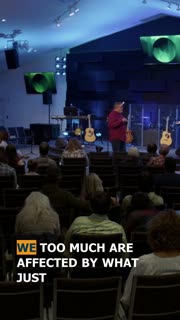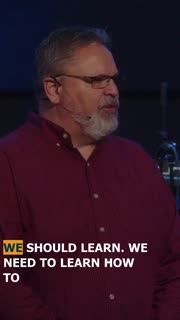Embracing the Better Covenant Through Christ's Sacrifice
Devotional
Sermon Summary
Bible Study Guide
Sermon Clips
1) "When you're in the scriptures, when you're reading the scriptures, you know, God said that Abel, Abel's blood cried out to him, the life is in the blood, and blood speaks. Now, I can't tell you everything about it, obviously, because I don't know. I don't fully get it, but there's truth in the fact that. That the blood speaks. And there's other places in the word where it talks about that. Well, so then when this song, what we're singing right now, says that his blood speaks a better word, what does that mean? Well, that means that just like what Jesus said on the night he was betrayed." [20:39] (49 seconds)
2) "The old covenant was, if you follow all these rules, you can be in. The new covenant is you trust what I'm going to do tomorrow, the next day when he was crucified, you trust me tomorrow, after after tomorrow. You trust what I do tomorrow and you're in. You don't have to follow any rules. That's a whole lot better. That's a better covenant. That's a better covenant and the blood. As. Just as we've been singing." [21:56] (35 seconds)
3) "We're going to remember, we're going to speak that. The words that he fulfilled on that cross, and it's. You listen to these words. It's healing, it's restoration, it's breaking of bondages. It's a better covenant. Do you know that the Old Testament, the Israelites in the Old Testament, when they partook of the bread, they would break the bread and says that I'm by his stripes, I will be healed. And they would partake of the bread at Passover. That was a sign of the covenant of healing." [24:33] (50 seconds)
4) "There's no end to him. There's no end to the spirit of God. There's no end to the knowledge of Jesus Christ. There's no end to the goodness of God. There's no end to the love of God. There's just no end. And this past week I was very blessed. And all the pastors of the nine churches and a couple of other ministers, I think there were 20 of us from RVFM that went to the ministers conference out in Colorado Springs. And in that, the Lord was just. Even I took voluminous notes and I thought, this is all still more. The deeper parts of God, there's so much more. And the more you dig, you keep. There's just more and more. You'll never exhaust God. You'll never run out of God. You'll never run out of his authority, his power, his love, his blessings. It's just my goodness. It's so amazing, the goodness of goddess." [41:32] (66 seconds)
5) "We too much are affected by what just happened five minutes ago, what somebody said to me or what I read in the newspaper, or how my body feels in the moment. We're too affected by that. Oh, I have a headache, and everything has to change because I have a headache. No, the headache has to change because his word says something different. His word says something better. And that physical symptom has to come in line with the word of God. And if you don't live that way, it actually sounds foolish. And Jesus said, he says his word is foolishness to the world, but you're not a part of the world anymore. You have a new culture." [45:08] (54 seconds)
6) "We should learn. We need to learn how to react to life situations by the spirit. And that's what we're talking about, the fruit of the spirit. If somebody disses dis, I'm so cool. I'm just so cool. Really not. I can't think of the word of what's dis. Disrespects. Thank you. I got there. I think I got there right before you did. Just. Just, you know, just so you know, if somebody disrespects you, how do you react to them? Well, the. The physical says I react this way. Retaliate, or whatever it is the spirit says. What does the spirit say? Bless them. Love them. That's hard. You have to learn to do. We formerly, formerly notice, I say formerly carnal people have to retrain. Our spirits are new, but our mind has to be renewed, and our body has to be renewed." [47:21] (71 seconds)
7) "Patience is not a wimpy response. Oh, I'll just sit here. No, patience is, I will sit here as long as it takes and I will hold on as long as it takes and I will not give up as long as it takes. We need to be tough in these days. We need to be tough right now and we need patience in these situations. All right, here's the definition of patience. I didn't get it to the video, so I apologize. Maybe we'll get it up sometime. Patience is the capacity to accept or tolerate delay. The capacity to accept or tolerate delay. Now, I did that the way I did it on purpose because I'm setting you up because it doesn't stop there. It's not a period, it's a comma. Capacity is to or patience is the capacity to accept or tolerate delay trouble. Oh, shoot. Trouble or suffering without getting angry or upset." [01:04:12] (89 seconds)
8) "We don't live in this physical world anymore. I mean, we live in this physical world, but we're not dictated any longer by this physical world. When trouble comes in our life, we need to have the fruit of the spirit of patience, that what the first things that come out of us is. All right, let's see what God's going to do on this one. Now, that's not a natural response that has to be trained. And the only way it's trained is by the Holy Spirit. The water of the word, the washing of the word and the holy and cooperating with the Holy Spirit. You can't sit there and go, I won't react. I won't react. I won't react. You focus on not reacting. What are you going to do? React. It takes training by the spirit that when that trouble, that moment comes, you immediately start looking for the Holy Spirit solution and not dwelling on whatever situation it is." [01:08:41] (65 seconds)
9) "We don't have to react to trouble. We don't have to react to suffering. That's the thing I remember. You thought I was going to skip that one, didn't you? The capacity to accept or tolerate delay, trouble or suffering without being angry or upset. And I'm not talking well, I'm going to have to bear this sickness. No sickness goes in Jesus name. I am healed. I am whole. You are healed. He's already done it. You're healed. Suffering is when people persecute you, when they despitefully use you. That's suffering. Having to deal with situations that are. That are outside of your control, where evil people are doing evil things. This world is stinking full of evil people doing evil things. How you react to it, how you react to it emotionally, psychologically, physically, has to be in patience and that's hard." [01:13:50] (65 seconds)
10) "Do you know that you have the authority to forgive their sins? Now the theological wheels are going. Now, I know Jesus was God on the cross. He says, forgive them, Father, for they know not what they do. But Stephen, Stephen, while he was being stoned to death, looked at them and said, Father, forgive them. Hold not this sin against them. And I've heard many theologians say, I've read a lot of books, I've heard a lot of people preach on it. They believe because Stephen prayed, that because Paul was standing in their midst is the reason that Paul got saved as God opened a door for Paul, because Stephen said, don't hold this against them. Don't hold this sin against our governor. Don't hold this sin, Lord, forgive them, Lord. I pray for their salvation. If all the Christians in Minnesota, Wisconsin, America would pray for our leaders with that kind of conviction. I'm telling you, man, watch out." [01:19:54] (71 seconds)
Ask a question about this sermon
2) "The old covenant was, if you follow all these rules, you can be in. The new covenant is you trust what I'm going to do tomorrow, the next day when he was crucified, you trust me tomorrow, after after tomorrow. You trust what I do tomorrow and you're in. You don't have to follow any rules. That's a whole lot better. That's a better covenant. That's a better covenant and the blood. As. Just as we've been singing." [21:56] (35 seconds)
3) "We're going to remember, we're going to speak that. The words that he fulfilled on that cross, and it's. You listen to these words. It's healing, it's restoration, it's breaking of bondages. It's a better covenant. Do you know that the Old Testament, the Israelites in the Old Testament, when they partook of the bread, they would break the bread and says that I'm by his stripes, I will be healed. And they would partake of the bread at Passover. That was a sign of the covenant of healing." [24:33] (50 seconds)
4) "There's no end to him. There's no end to the spirit of God. There's no end to the knowledge of Jesus Christ. There's no end to the goodness of God. There's no end to the love of God. There's just no end. And this past week I was very blessed. And all the pastors of the nine churches and a couple of other ministers, I think there were 20 of us from RVFM that went to the ministers conference out in Colorado Springs. And in that, the Lord was just. Even I took voluminous notes and I thought, this is all still more. The deeper parts of God, there's so much more. And the more you dig, you keep. There's just more and more. You'll never exhaust God. You'll never run out of God. You'll never run out of his authority, his power, his love, his blessings. It's just my goodness. It's so amazing, the goodness of goddess." [41:32] (66 seconds)
5) "We too much are affected by what just happened five minutes ago, what somebody said to me or what I read in the newspaper, or how my body feels in the moment. We're too affected by that. Oh, I have a headache, and everything has to change because I have a headache. No, the headache has to change because his word says something different. His word says something better. And that physical symptom has to come in line with the word of God. And if you don't live that way, it actually sounds foolish. And Jesus said, he says his word is foolishness to the world, but you're not a part of the world anymore. You have a new culture." [45:08] (54 seconds)
6) "We should learn. We need to learn how to react to life situations by the spirit. And that's what we're talking about, the fruit of the spirit. If somebody disses dis, I'm so cool. I'm just so cool. Really not. I can't think of the word of what's dis. Disrespects. Thank you. I got there. I think I got there right before you did. Just. Just, you know, just so you know, if somebody disrespects you, how do you react to them? Well, the. The physical says I react this way. Retaliate, or whatever it is the spirit says. What does the spirit say? Bless them. Love them. That's hard. You have to learn to do. We formerly, formerly notice, I say formerly carnal people have to retrain. Our spirits are new, but our mind has to be renewed, and our body has to be renewed." [47:21] (71 seconds)
7) "Patience is not a wimpy response. Oh, I'll just sit here. No, patience is, I will sit here as long as it takes and I will hold on as long as it takes and I will not give up as long as it takes. We need to be tough in these days. We need to be tough right now and we need patience in these situations. All right, here's the definition of patience. I didn't get it to the video, so I apologize. Maybe we'll get it up sometime. Patience is the capacity to accept or tolerate delay. The capacity to accept or tolerate delay. Now, I did that the way I did it on purpose because I'm setting you up because it doesn't stop there. It's not a period, it's a comma. Capacity is to or patience is the capacity to accept or tolerate delay trouble. Oh, shoot. Trouble or suffering without getting angry or upset." [01:04:12] (89 seconds)
8) "We don't live in this physical world anymore. I mean, we live in this physical world, but we're not dictated any longer by this physical world. When trouble comes in our life, we need to have the fruit of the spirit of patience, that what the first things that come out of us is. All right, let's see what God's going to do on this one. Now, that's not a natural response that has to be trained. And the only way it's trained is by the Holy Spirit. The water of the word, the washing of the word and the holy and cooperating with the Holy Spirit. You can't sit there and go, I won't react. I won't react. I won't react. You focus on not reacting. What are you going to do? React. It takes training by the spirit that when that trouble, that moment comes, you immediately start looking for the Holy Spirit solution and not dwelling on whatever situation it is." [01:08:41] (65 seconds)
9) "We don't have to react to trouble. We don't have to react to suffering. That's the thing I remember. You thought I was going to skip that one, didn't you? The capacity to accept or tolerate delay, trouble or suffering without being angry or upset. And I'm not talking well, I'm going to have to bear this sickness. No sickness goes in Jesus name. I am healed. I am whole. You are healed. He's already done it. You're healed. Suffering is when people persecute you, when they despitefully use you. That's suffering. Having to deal with situations that are. That are outside of your control, where evil people are doing evil things. This world is stinking full of evil people doing evil things. How you react to it, how you react to it emotionally, psychologically, physically, has to be in patience and that's hard." [01:13:50] (65 seconds)
10) "Do you know that you have the authority to forgive their sins? Now the theological wheels are going. Now, I know Jesus was God on the cross. He says, forgive them, Father, for they know not what they do. But Stephen, Stephen, while he was being stoned to death, looked at them and said, Father, forgive them. Hold not this sin against them. And I've heard many theologians say, I've read a lot of books, I've heard a lot of people preach on it. They believe because Stephen prayed, that because Paul was standing in their midst is the reason that Paul got saved as God opened a door for Paul, because Stephen said, don't hold this against them. Don't hold this sin against our governor. Don't hold this sin, Lord, forgive them, Lord. I pray for their salvation. If all the Christians in Minnesota, Wisconsin, America would pray for our leaders with that kind of conviction. I'm telling you, man, watch out." [01:19:54] (71 seconds)










